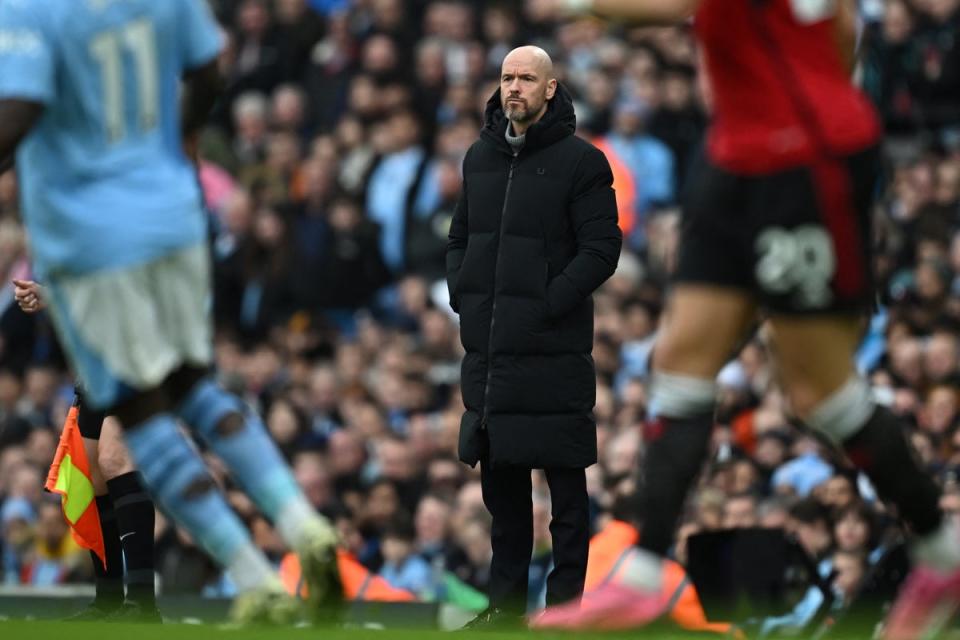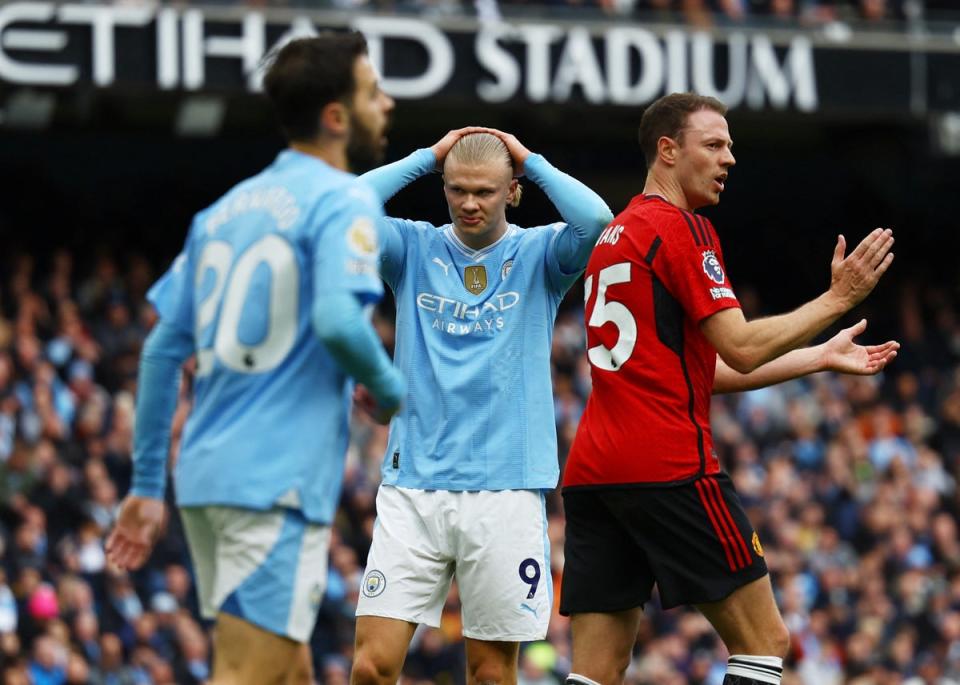Man United are miles behind their rivals - marginal gains won't cut ...
Manchester United did quite a lot right. They had three shots and Manchester City had 27. Several United players had fine games in the derby. They barely had a quarter of possession. Erik ten Hag arguably got his team selection and tactics correct. His team lost 3-1.

“Small margins,” said Ten Hag. But also big margins. Some of the Dutchman’s post-match verdicts this season have not stood up to much scrutiny. If his assessment of the 192nd Manchester derby, and City’s sixth win over United in the last seven, was red-tinted, the concurrent slimness and thickness of the distance between clubs separated by about five miles was revealing.
“We were really close to winning or at least to getting a point here,” said Ten Hag. He highlighted defining moments in a game his side led for far longer than they trailed, particularly his belief Marcus Rashford should have been given a free kick seconds before City equalised.
United have had worse derby defeats in recent years: more emphatic ones, more embarrassing ones, matches where they have been demolished before half-time, their gameplan in ruins before the break. This was one where they only started to look ragged in the last few minutes. It was one of their more respectable derby defeats: some would say it is problem that a 3-1 loss felt entirely respectable.
But Sir Jim Ratcliffe’s stated aim to knock City off their perch in three years can feel less realistic than Ralf Rangnick’s declaration two years ago that United required open-heart surgery.
Because they had heart at the Etihad Stadium; strategy, too. There was no lack of character, those with injury issues playing. Jonny Evans and Marcus Rashford “fought to be in this game” and Ten Hag had to take each off; each hampered, Bruno Fernandes, Raphael Varane and Casemiro could have all opted to sit it out. Each competed admirably. This was not an afternoon to suggest the players have given up on Ten Hag.
Nor he on them. After trailing 6-1 at the Etihad Stadium last season, and eventually losing 6-3, the manager compromised and showed more pragmatism. His was a cautious blueprint. United defended deep, packed the midfield more than normal and were less open to transitions.

As an ersatz attacker, Fernandes fared better as a false nine than he and Paul Pogba did as twin false nines at the Etihad under Rangnick. Behind him, Ten Hag protected his older, slower players. Casemiro showed he can still prosper when he is not exposed to wide open spaces. Varane was outstanding, as he was at Anfield; give the serial Champions League winner a major test and he can respond. Tormented by Haaland at Old Trafford, Evans excelled in the rematch. The odds seemed stacked against him, but positional sense and innate calm aided the veteran. He and Varane restricted Erling Haaland to 15 touches but Sofyan Amrabat gifted the Norwegian a goal.
Yet it was damning that United ended up looking reliant on a 36-year-old free transfer. Evans’ departure was compounded by the need to reshuffle the entire defence when Willy Kambwala came on at right-back, where he was promptly targeted.
Erik ten Hag watches on as Man City beat Man United (AFP via Getty Images)
It underlined the sense that Ten Hag had made the best of a bad hand, picking the only 11 available players who are capable of contributing on such a stage, fashioning a formula to camouflage their weaknesses. Yet while injuries are a factor, United have spent £400m in his reign, £800m on this squad, and ended up undermined by their lack of strength in depth.
It was an indictment that the four substitutes used were Antony, Amrabat, Kambwala and Omari Forson: two terrible signings and two teenagers. No wonder, then, that this was the first time since Leicester in 2014 that United lost after leading at half-time in the Premier League. They had no shot in the second half, losing their attacking threat. They ended up encamped around and in their box. It took a Phil Foden wonder goal to draw City level, but United would have conceded earlier but for a remarkable miss by Haaland.
Haaland missed from two yards out but scored later (Action Images via Reuters)
They were underdogs, but they had to play underdog football. That isn’t Ten Hag’s ethos but he didn’t have the players to use a high defensive line or play at a high tempo; but those are the prevailing approaches at the highest levels of the game. It left him with the sort of approach a mid-table team might take at the Etihad Stadium, which in turn showed how far they are from competing as equals.
Eighteen points behind City, likelier to be in the Europa League than the Champions League next season, beaten 11 times and with a negative goal difference in the Premier League, United’s slide is such that they can do quite a lot right against their neighbours, see several of Pep Guardiola’s players not reach their best and still lose 3-1.
There are plenty of days this season when United have been wretched. This was not one of them. But, as they enter the watching Sir Dave Brailsford’s world of marginal gains, the bigger picture is that the margins between the neighbours isn’t small, and that United need to gain a lot.









































